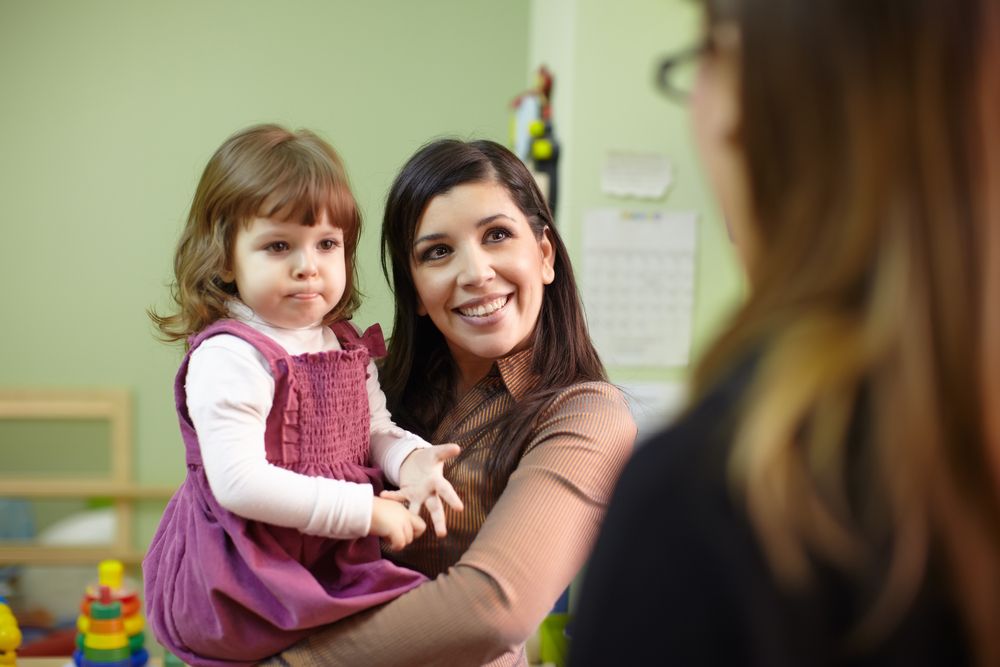Why is it important to build a good relationship with your child's educator?
Published on Wednesday, 21 August 2019
Last updated on Tuesday, 31 December 2019

Ninety per cent of a child's brain is developed in the first five years, and although parents play a primary role in helping children grow and learn at this crucial time, we also rely on early learning educators to support our under fives and set them up for future success.
Harvard University's Center for the Developing Child says that, 'Responsive relationships and positive experiences build strong brain architecture' and lay the foundations for children's educational achievement, lifelong health, economic productivity and more; so it's important that you find a quality early childhood education and care service for your child, then make the effort to form genuine and trusting partnerships with its educators.
Collaborating with an educator will help your child feel secure in their care and ready to connect, learn, and reach their full potential. From your point of view, a good relationship allows you to share in your child’s successes, work through any challenges with an expert and have input in your child's early education.
Strong and positive relationships also say a lot about the quality of your child's ECE service. The Education Review Office says, 'High quality services recognise children's place as part of a wider family/whānau and iwi. Family/whānau aspirations for their children are valued and are an integral part of assessment that help adults plan programmes and work with children. Parents and whānau are comfortable spending time at the service and are consulted in genuine and meaningful ways.'
Responsive relationships are vital for your child's healthy brain development, they're beneficial for you as a parent and they point towards the quality of an ECE service.
A genuine partnership involves you and the educator working together to find the best outcomes for your child. It involves trust and two-way respect, the regular exchange of information and a consistent approach when it comes to your child's daily routines, development and learning.
It's important to value one another's role in your child's life, share insights and perspectives, and make decisions together. Although it can take time to build a genuine relationship, here are some ways to purposively work together:
1. Start with a good impression
When you first visit the service or meet a new educator, take the time to introduce yourself and form an early connection. This can involve a tour of the service, asking introductory questions, or simply saying 'hello' to a new face.
2. Make an effort to regularly interact with your educator
Although drop-off and pick-up can be busy times, try not rush in and out every day. Take a moment to ask how the day was or admire your child's portfolio, and for longer conversations you can schedule a time to meet with your educator, such as discussing ways to support your child's learning at home, or work through a concern.
Along with face-to-face interaction, there is also the option of calling, texting, or emailing the service, using an online portal, writing in a communications book, keeping up-to-date with newsletters and noticeboards, and participating in special events like fundraisers or themed days.
3. Share information about your child and family
You don't need to be best friends with your educator, but it's good to get to know each other as people and give them a better understanding of your child and your family, so they can consult with you in a genuine and individualised way.
Whether you have an informal chat or go along to a planned event, it's beneficial to share information about your child, like special interests, strengths or particular concerns, and details about your family, your culture, values, or dynamic, so educators can tailor your child's learning experiences and form meaningful connections between home and child care.
Think about your expectations, priorities and hopes for your child's learning and communicate these to your educator.
4. Read the service's philosophy statement
To get a sense of what is special about your child's service and what it aims to achieve, read the service's philosophy statement. This will contain information about how the service values and encourages partnerships with families and you can then ask your educator any questions and make positive moves to build a genuine relationship.
5. Support your educator administratively
Although paperwork sounds boring, it's an important way to share vital information and support educators. Always keep your child's enrolment forms up-to-date by providing current emergency contact numbers and follow the service's policies like keeping your child home when they're 'too sick' to prevent the spread of illness.
6. Show gratitude
Whether you give your educator a simple 'Thank you' at pick-up time, a bunch of flowers or something nice for Christmas, even small gestures have a positive impact. A good relationship is built on respect and the valuing of one another, so show your appreciation for the early learning and care they provide and mention positive developments you've witnessed in your child.
At the end of the day, you and your educator have a shared goal. You both want your child to reach their full potential and benefit from responsive relationships and positive experiences in their early years, so lead by example and build genuine partnerships to support them along the way.
References
Harvard University
Education Review Office
Ministry of Education
First Five Years
Related Articles

How to communicate with parents when there is an issue
Positive partnerships with parents are based on effective and regular communication work to ensure the best outcomes for children.

Communicating tricky issues
Tips for communicating tricky topics effectively with families.

What to do if your child doesn't want to go to child care
Coping with child care refusal on those mornings when your little one just doesn't want to go.
